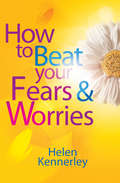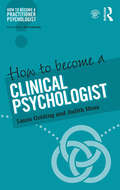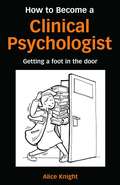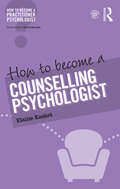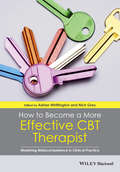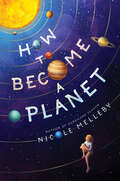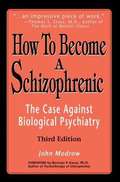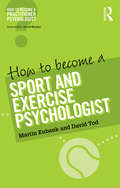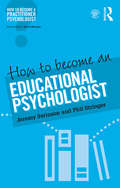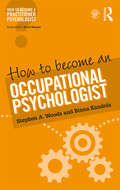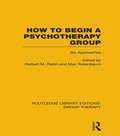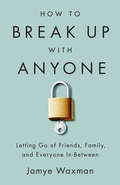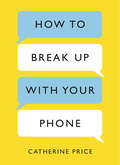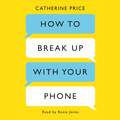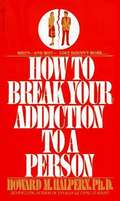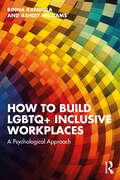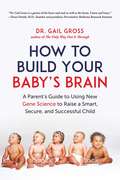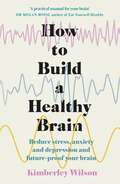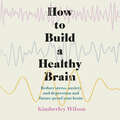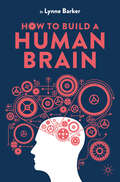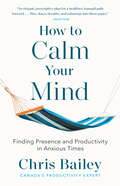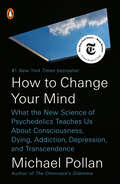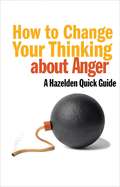- Table View
- List View
How to Beat Your Fears and Worries (Overcoming Ser.)
by Helen KennerleyOvercoming app now available via iTunes and the Google Play Store.We all worry about stuff in our lives, but some of us may find ourselves worrying excessively, even about those things completely beyond our control. Or we may simply find that worrying thoughts are dominating our daily life and are destroying our quality of life. Of course we all have worries, but rather than labelling yourself a 'worry wart' or 'worrier', you can overcome your chronic anxiety and start to lead a happier, more fulfilling life. Cognitive Behavioural Therapy, on which this self-help book is based, is a recognised, effective treatment for anxiety. It will help you to recognise and challenge your negative and anxious thoughts, and change any behaviour which may have inadvertently kept your anxiety going, and move towards a more worry-free future.
How to Become a Clinical Psychologist (How to become a Practitioner Psychologist)
by Laura Golding Judith MossClinical Psychology is a very popular and competitive career path for psychology students. This practical and accessible guide contains all the information and advice required by those considering pursuing a career in the field. How to Become a Clinical Psychologist provides a clear overview of a career in clinical psychology, with chapters examining areas such as the educational and work experience requirements for selection, the doctoral training programmes and the personal qualities and attributes necessary for the profession. The training process is described and the wide range of career options post-qualification are outlined, supported with testimonials and first-hand accounts from clinical psychologists, current trainees and those aspiring to this career. Practical advice and examples are given throughout the guide and a wide range of real-life examples bring the realities of this challenging yet rewarding career to life. Written by established clinical psychologists who have extensive clinical experience in the NHS and in the selection and training of doctoral trainees, this book provides valuable information on the educational, vocational and personal requirements for the career. The perfect guide for anyone interested in clinical psychology, How to Become a Clinical Psychologist is an indispensable resource for A-Level students, undergraduates considering the discipline and anyone considering a career in this popular and fascinating profession. This book is one of seven in the "How to Become a Practitioner Psychologist" series, each covering a different psychology career. The other titles in the series can be found here: http://www.routledgetextbooks.com/textbooks/howtopsy/
How to Become a Clinical Psychologist: Getting a Foot in the Door
by Alice KnightBased on information gathered from assistants, trainee clinical psychologists and clinical psychology course directors across the country, How to Become a Clinical Psychologist includes: information on work experience advice on job applications and interviews details of research projects and training guest chapters dealing with reflections from trainees and professional issues. This guide is the first of its kind and will be an essential companion for anyone interested in pursuing a career in clinical psychology.
How to Become a Counselling Psychologist
by Elaine KasketCounselling psychologists can play a fundamental and inspiring role in people’s lives. Their aim is to address a range of psychological and emotional issues, helping people to live more skilful, effective, and meaningful lives. But how do you qualify, and what is being a counselling psychologist really like? How to Become a Counselling Psychologist is the first book to provide a clear, practical guide to the pathway to qualifying as a counselling psychologist. Written by an experienced practitioner, and incorporating testimonials from trainees, trainers, and qualified counselling psychologists, it explains every step of the journey, including advice on a suitable degree course, making the most of a training placement, how to prepare for the job interview, and the challenges of making the transition from training to qualification. Written for anyone from current students to those interested in a change of career, How to Become a Counselling Psychologist is an indispensable guide for anyone interested in this rich and varied branch of psychology.
How to Become a More Effective CBT Therapist: Mastering Metacompetence in Clinical Practice
by Adrian Whittington Nick GreyHow to Become a More Effective CBT Therapist explores effective ways for therapists to move beyond competence to “metacompetence”, remaining true to the core principles of CBT while adapting therapeutic techniques to address the everyday challenges of real-world clinical work. This innovative text explores how to: Work most effectively with fundamental therapeutic factors such as the working alliance and diversity; Tackle complexities such as co-morbidity, interpersonal dynamics and lack of progress in therapy; Adapt CBT when working with older people, individuals with long-term conditions (LTCs), intellectual disabilities, personality disorders and psychosis; Develop as a therapist through feedback, supervision, self-practice and training.
How to Become a Planet
by Nicole MellebyFor Pluto, summer has always started with a trip to the planetarium. It&’s the launch to her favorite season, which also includes visits to the boardwalk arcade, working in her mom&’s pizzeria, and her best friend Meredith&’s birthday party. But this summer, none of that feels possible. A month before the end of the school year, Pluto&’s frightened mom broke down Pluto&’s bedroom door. What came next were doctor&’s appointments, a diagnosis of depression, and a big black hole that still sits on Pluto&’s chest, making it too hard to do anything. Pluto can&’t explain to her mom why she can&’t do the things she used to love. And it isn&’t until Pluto&’s dad threatens to make her move with him to the city—where he believes his money, in particular, could help—that Pluto becomes desperate enough to do whatever it takes to be the old Pluto again. She develops a plan and a checklist: If she takes her medication, if she goes to the planetarium with her mom for her birthday, if she successfully finishes her summer school work with her tutor, if she goes to Meredith&’s birthday party . . . if she does all the things that &“normal&” Pluto would do, she can stay with her mom in Jersey. But it takes a new therapist, a new tutor, and a new (and cute) friend with a checklist and plan of her own for Pluto to learn that there is no old and new Pluto. There&’s just her.
How to Become a Schizophrenic: The Case Against Biological Psychiatry
by John ModrowThe author describes his experience as a diagnosed schizophrenic and then examines the medical model of schizophrenia, which he believes to be seriously flawed.
How to Become a Sport and Exercise Psychologist (How to become a Practitioner Psychologist)
by David Tod Martin EubankWhether you are an athlete suffering from nerves or someone who lacks motivation to exercise, sport and exercise psychology can help. As the discipline of psychology evolves, more and more people are training to become sport and exercise psychologists. But how do you qualify, and when you do, what is the job really like? This is the first guide to this fascinating and growing profession. It provides an overview of what the role involves, the educational qualifications and training you will need to take, and what those first few years in the job are actually like. It includes a wealth of tips on how to make the most of the opportunities available. The book also features testimonials from people currently working in the field, who reveal not only what helped them along the way, but also what they would have done differently. How to Become a Sport and Exercise Psychologist is authored by two of the leading academics within sport and exercise psychology in the UK, both of whom have a wealth of experience in the field. The guide is the perfect companion for anyone considering this exciting career.
How to Become an Educational Psychologist (How to become a Practitioner Psychologist)
by Jeremy Swinson Phil StringerEducational psychologists can play a fundamental and inspiring role in people’s lives. A vibrant and expanding profession, educational psychology is becoming more influential in the lives of children and in its influence in government policy. But how do you qualify, and what is being an educational psychologist really like? How to Become an Educational Psychologist is the first book to provide a clear, practical guide to the pathway to qualifying as an educational psychologist. Written by two educational psychologists with a wealth of experience in both education and training, and incorporating testimonials from trainees, trainers, and qualified educational psychologists, it explains every step of the journey, including advice on a suitable degree course, making the most of a training placement, how to prepare for the job interview, and the challenges of making the transition from training to qualification. Written for anyone from current students to those interested in a change of career, How to Become an Educational Psychologist is the perfect companion for anyone interested in this varied, rewarding, and popular profession.
How to Become an Occupational Psychologist (How to become a Practitioner Psychologist)
by Stephen A. Woods Binna KandolaThe business world is increasingly aware of the value of psychology. And as organizations turn to Occupational Psychologists to help build positive, effective and healthy workplaces, so an increasing number of psychologists are choosing this fascinating area of work to make their impact as a practitioner. But how do you qualify, and what is the job really like? How to Become an Occupational Psychologist is the first book to provide an overview of the educational and professional pathway to becoming an Occupational Psychologist. Providing a summary of what the role entails, and what training is required, it is written by people currently working in the field, sharing not only what helped them in their careers, but also what they learned along the way. Occupational Psychologists Professor Stephen Woods and Professor Binna Kandola have a wealth of experience in both education and consultancy, which they have brought to life in this edition, a perfect companion for anyone interested in moving into this exciting profession.
How to Begin a Psychotherapy Group: Six Approaches (Routledge Library Editions: Group Therapy)
by Max Rosenbaum Herbert M. RabinOriginally published in 1976, this book discusses the formation and beginning of psychotherapy groups and examines the treatment of a number of social problems through group therapy. Inevitably a product of the time in which it was written, this book nonetheless makes a valuable contribution to the history of group psychotherapy and will still be of interest to group psychotherapists, psychoanalysts, psychiatrists, social scientists, social workers and group managers today.
How to Break Up With Anyone: Letting Go of Friends, Family, and Everyone In-Between
by Jamye WaxmanNot all relationships are made to last forever. Sometimes what starts as a beautiful friendship or productive partnership turns toxic, or one-sided, or unhealthy - and the best solution for both parties is to end it. In How to Break Up With Anyone, relationship expert Jamye Waxman has written a much-needed guide to every step of a non-romantic breakup. Drawing from her own experiences, Jamye provides strategies for disengaging from a friend, family member, community, or even former version of oneself, addressing both practical and emotional concerns. While ending a relationship can be painful, Jamye's positive message focuses on the ultimately liberating aspects of putting unhealthy relationships to rest.Chapters include:Breaking Up Versus Taking a BreakBest Friends Forever No MoreBreaking Up With FamilyKissing Community GoodbyeRelabeling Your Sexuality and GenderBreaking Up With Your CareerBreaking Up With Anyone ElseBeing Broken Up WithHow to Break Up With Anyone provides the tools for anyone to initiate a breakup, the encouragement to get through it, and the wisdom to recognize that they don't have to settle for anything less than productive, healthy relationships. Covering a variety of relationships, How to Break Up With Anyone is a timeless resource for people of all ages.
How to Break Up With Your Phone: The 30-Day Plan to Take Back Your Life
by Catherine PriceIs your phone the first thing you reach for when you wake up? And the last thing you see before you sleep? Do you find the hours slip away as you idly scroll through your social media timeline? In short, are you addicted to your phone? If so, How to Break Up with Your Phone is here to help. How to Break Up With Your Phone is a smart, practical and useful plan to help you conquer your mobile phone addiction in just 30 days - and take back your life in the process. Recent studies have shown that spending extended time on our phones affects our ability to form new memories, think deeply, focus and absorb information, and the hormones triggered every time we hear our phones buzz both add to our stress levels and are the hallmark signs of addiction. In How to Break Up with Your Phone, award-winning science journalist Catherine Price explores the effects that our constant connectivity is having on our brains, bodies, relationships, and society at large and asks, how much time do you really want to spend on your phone? Over the course of 30 days, Catherine will guide you through an easy-to-follow plan that enables you to identify your goals, priorities and bad habits, tidy your apps, prune your email, and take time away. Lastly, you will create a new, healthier relationship with your phone and establish habits and routines to ensure this new relationship sticks. You don't have to give up your phone forever; instead you will be more mindful not only of how you use your phone, but also about how you choose to spend the precious moments of your life.
How to Break Up With Your Phone: The 30-Day Plan to Take Back Your Life
by Catherine PriceIs your phone the first thing you reach for when you wake up? And the last thing you see before you sleep? Do you find the hours slip away as you idly scroll through your social media timeline? In short, are you addicted to your phone? If so, How to Break Up with Your Phone is here to help. How to Break Up With Your Phone is a smart, practical and useful plan to help you conquer your mobile phone addiction in just 30 days - and take back your life in the process. Recent studies have shown that spending extended time on our phones affects our ability to form new memories, think deeply, focus and absorb information, and the hormones triggered every time we hear our phones buzz both add to our stress levels and are the hallmark signs of addiction. In How to Break Up with Your Phone, award-winning science journalist Catherine Price explores the effects that our constant connectivity is having on our brains, bodies, relationships, and society at large and asks, how much time do you really want to spend on your phone? Over the course of 30 days, Catherine will guide you through an easy-to-follow plan that enables you to identify your goals, priorities and bad habits, tidy your apps, prune your email, and take time away. Lastly, you will create a new, healthier relationship with your phone and establish habits and routines to ensure this new relationship sticks. You don't have to give up your phone forever; instead you will be more mindful not only of how you use your phone, but also about how you choose to spend the precious moments of your life.Read by Rosie Jones(p) Orion Publishing Group 2018
How to Break Your Addiction to a Person
by Howard M. HalpernAre you in love - or addicted? How to know when to call it quits ... and how to find the courage to do it.
How to Build LGBTQ+ Inclusive Workplaces: A Psychological Approach
by Binna Kandola Ashley WilliamsBringing together the latest research with practical insights from the authors’ professional experience, this important book provides a context for the conversations that are needed within organisations and offers practical guidance towards action that can be taken to improve the working life of LGBTQ+ employees.The book begins by asking how we got here. It outlines the development of stigma towards the LGBTQ+ community from both a historical and psychological perspective before going on to explore the ways in which societal attitudes manifest in the work environment. It then looks specifically at LGBTQ+ experiences in the workplace, covering discrimination and exclusion and their impact at both an individual and organisational level before taking an intersectional view of LGBTQ+ identity, and particularly how it interacts with race, disability and age. The book then provides clear and practical guidance on how to build an LGBTQ+ inclusive workplace, covering organisational policy and culture, leadership and allyship. Throughout, the authors use case studies to demonstrate how to implement policies across a range of regions and offer strategies to minimise homophobic and discriminatory attitudes.Taking a psychological approach to this important topic, the book is essential reading for all those looking to build and sustain welcoming and inclusive workplaces across all sectors. It will also be of interest to students in psychology, management and human resources studying workplace attitudes and culture.
How to Build Your Baby's Brain: A Parent's Guide to Using New Gene Science to Raise a Smart, Secure, and Successful Child
by Gail GrossYour child’s DNA is not destiny; you are at the helm, guiding their course. The truth is, nature and nurture are in a delicate dance—if one goes too fast, the other one falls. Science tells us that early childhood experiences have the capacity to structure and alter the brain. That means you didn’t just supply your child’s DNA—you’re still shaping it. And it’s only by wielding this power that your child will activate their full potential. You are truly a gene therapist; manipulating and guiding your child’s genetic makeup based on the experiences you create for them. Contrary to what modern parenting trends have told us, parenting is much simpler than we dared to imagine. Great parenting comes down to one mission: to be prepped and present for the windows of your child’s development so that you can take full advantage of them and help your child become a smart, successful, self-sufficient adult. It doesn’t require formal training or a fancy degree—all it takes is getting involved. Once parents learn how to flip the right gene “switches,” they can expand the limits of their child’s potential and lay the emotional and intellectual groundwork that allows them to seize opportunities for success fearlessly, naturally, and enthusiastically. With a PhD. in education and a second in psychology, and forty years of experience as an educator, Dr. Gross combines an understanding of childhood development with practical and realistic tools to teach parents how to best take advantage of their child’s developmental windows. How to Build Your Baby's Brain translates the results from scientific studies about expanding consciousness and performance into day-to-day interaction between parents and children.
How to Build a Healthy Brain: Reduce stress, anxiety and depression and future-proof your brain
by Kimberley Wilson'A practical manual for your brain.' - Dr Megan Rossi, author of Eat Yourself HealthyA groundbreaking science-based guide to protecting your brain health for the long term.Whatever your age, having a healthy brain is the key to a happy and fulfilled life. Yet, for both young and old, diseases of the brain and mental health are the biggest killers in the 21st century. We all know how to take care of our physical health, but we often feel powerless as to what we can do to protect our mental well-being too.How to Build a Healthy Brain is here to help. Written by a passionate advocate for the importance of mental health, Chartered Psychologist Kimberley Wilson draws on the latest research to give practical, holistic advice on how you can protect your brain health by making simple lifestyle choices. With chapters on Sleep, Nutrition, Exercise and Meditation, Kimberley has written an empowering guide to help you look after both your physical and mental well-being.'Finally, a book that puts the brain at the centre of the health conversation, where it belongs.' - Shona Vertue, author of The Vertue Method'A psychologist, she runs a successful private clinic in central London, combining therapy with nutrition advice, and has just written her first (excellent) book, How to Build a Healthy Brain, about protecting our mental wellbeing through factors such as diet, sleep and exercise.' - The Times 'I love your book ... it made me equal parts really excited and passionate, and also pretty angry. The science is there but it isn't being translated. This is a huge area that affects us all ... your book is absolutely brilliant at explaining what we can do to look after our brain health.' - Ella Mills on Deliciously Ella: The Podcast
How to Build a Healthy Brain: Reduce stress, anxiety and depression and future-proof your brain
by Kimberley Wilson'A practical manual for your brain.' - Dr Megan Rossi, author of Eat Yourself HealthyA groundbreaking science-based guide to protecting your brain health for the long term.Whatever your age, having a healthy brain is the key to a happy and fulfilled life. Yet, for both young and old, diseases of the brain and mental health are the biggest killers in the 21st century. We all know how to take care of our physical health, but we often feel powerless as to what we can do to protect our mental well-being too.How to Build a Healthy Brain is here to help. Written by a passionate advocate for the importance of mental health, Chartered Psychologist Kimberley Wilson draws on the latest research to give practical, holistic advice on how you can protect your brain health by making simple lifestyle choices. With chapters on Sleep, Nutrition, Exercise and Meditation, Kimberley has written an empowering guide to help you look after both your physical and mental well-being.'Finally, a book that puts the brain at the centre of the health conversation, where it belongs.' - Shona Vertue, author of The Vertue Method'A psychologist, she runs a successful private clinic in central London, combining therapy with nutrition advice, and has just written her first (excellent) book, How to Build a Healthy Brain, about protecting our mental wellbeing through factors such as diet, sleep and exercise.' - The Times 'I love your book ... it made me equal parts really excited and passionate, and also pretty angry. The science is there but it isn't being translated. This is a huge area that affects us all ... your book is absolutely brilliant at explaining what we can do to look after our brain health.' - Ella Mills on Deliciously Ella: The Podcast
How to Build a Healthy Brain: Reduce stress, anxiety and depression and future-proof your brain
by Kimberley WilsonA groundbreaking science-based guide to protecting your brain health for the long term.Whatever your age, having a healthy brain is the key to a happy and fulfilled life. Yet, for both young and old, diseases of the brain and mental health are the biggest killers in the 21st century. We all know how to take care of our physical health, but we often feel powerless as to what we can do to protect our mental well-being too.How to Build a Healthy Brain is here to help. Written by a passionate advocate for the importance of mental health, Chartered Psychologist Kimberley Wilson draws on the latest research to give practical, holistic advice on how you can protect your brain health by making simple lifestyle choices. With chapters on Sleep, Nutrition, Exercise and Meditation, Kimberley has written an empowering guide to help you look after both your physical and mental well-being.(P) 2020 Hodder & Stoughton Ltd
How to Build a Human Brain
by Lynne BarkerHow to Build a Human Brain takes a developmental approach to understanding brain structure and function. It guides readers through the evolution of the human brain, from its cellular building blocks, up to hind brain structures and functions, and through to neocortex and associated functions. In doing so, it enables students to develop a comprehensive knowledge of the relationship between brain networks and functions, neural underpinnings of functional problems seen after neuropathology, and neuroanatomy.Written in an engaging style, each chapter follows a blueprint format with subsections on issues like 'damage and repair' and 'faulty wiring' as the brain is ‘built’ across the course of the book. The author includes illustrative case studies and entertaining fast fact boxes to highlight the real-word relevance of each brain structure being examined. This textbook offers an accessible reference for students of neuroscience, cognitive neuroscience, neuropsychology,and biological psychology.
How to Calm Your Mind: Finding Presence and Productivity in Anxious Times
by Chris BaileyA toolkit of accessible, science-backed strategies that reveal that the path to a less anxious life, and even greater productivity, runs directly through calm.When Chris Bailey, productivity expert, discovered that he had become stressed and burnt out because he was pushing himself too hard, he realized that he had no right to be giving advice on productivity without learning when and how to rein things in and take a break. Productivity advice works—and we need it now more than ever—but it&’s just as important that we also develop our capacity for calm. By finding calm and overcoming anxiety, we don&’t just feel more comfortable in our own skin, we invest in the missing piece that leads our efforts to become sustainable over time. We build a deeper, more expansive reservoir of energy to draw from throughout the day, and have greater mental resources at our disposal to not only do good work, but to also live a good life.Among the topics How to Calm Your Mind covers are how analog and digital worlds affect calm and anxiety in different ways; how our desire for dopamine, a neurotransmitter in our brain that leads us to feel overstimulated, breeds anxiety, dissatisfaction, and needless stress, but can be countered by other neurochemicals; how hidden sources of stress can be tamed by a &“stimulation fast&”; and how &“busyness&” is as much a state of mind as it is an actual state of life. The pursuit of calm ultimately leads us to become more engaged, focused, and deliberate—while making us more productive and satisfied with our lives overall. In an anxious world, achieving calm is the best life hack around.
How to Calm Your Mind: Finding Presence and Productivity in Anxious Times
by Chris BaileyA toolkit of accessible, science-backed strategies that reveal that the path to a less anxious life, and even greater productivity, runs directly through calm.When Chris Bailey, productivity expert, discovered that he had become stressed and burnt out because he was pushing himself too hard, he realized that he had no right to be giving advice on productivity without learning when and how to rein things in and take a break. Productivity advice works—and we need it now more than ever—but it&’s just as important that we also develop our capacity for calm. By finding calm and overcoming anxiety, we don&’t just feel more comfortable in our own skin, we invest in the missing piece that leads our efforts to become sustainable over time. We build a deeper, more expansive reservoir of energy to draw from throughout the day, and have greater mental resources at our disposal to not only do good work, but to also live a good life.Among the topics How to Calm Your Mind covers are how analog and digital worlds affect calm and anxiety in different ways; how our desire for dopamine, a neurotransmitter in our brain that leads us to feel overstimulated, breeds anxiety, dissatisfaction, and needless stress, but can be countered by other neurochemicals; how hidden sources of stress can be tamed by a &“stimulation fast&”; and how &“busyness&” is as much a state of mind as it is an actual state of life. The pursuit of calm ultimately leads us to become more engaged, focused, and deliberate—while making us more productive and satisfied with our lives overall. In an anxious world, achieving calm is the best life hack around.
How to Change Your Mind: What the New Science of Psychedelics Teaches Us About Consciousness, Dying, Addiction, Depression, and Transcendence
by Michael PollanNew York Times Book Review 10 Best Books of 2018A New York Times Notable Book The #1 New York Times bestseller.A brilliant and brave investigation into the medical and scientific revolution taking place around psychedelic drugs--and the spellbinding story of his own life-changing psychedelic experiences When Michael Pollan set out to research how LSD and psilocybin (the active ingredient in magic mushrooms) are being used to provide relief to people suffering from difficult-to-treat conditions such as depression, addiction and anxiety, he did not intend to write what is undoubtedly his most personal book. But upon discovering how these remarkable substances are improving the lives not only of the mentally ill but also of healthy people coming to grips with the challenges of everyday life, he decided to explore the landscape of the mind in the first person as well as the third. Thus began a singular adventure into various altered states of consciousness, along with a dive deep into both the latest brain science and the thriving underground community of psychedelic therapists. Pollan sifts the historical record to separate the truth about these mysterious drugs from the myths that have surrounded them since the 1960s, when a handful of psychedelic evangelists inadvertently catalyzed a powerful backlash against what was then a promising field of research.A unique and elegant blend of science, memoir, travel writing, history, and medicine, How to Change Your Mind is a triumph of participatory journalism. By turns dazzling and edifying, it is the gripping account of a journey to an exciting and unexpected new frontier in our understanding of the mind, the self, and our place in the world. The true subject of Pollan's "mental travelogue" is not just psychedelic drugs but also the eternal puzzle of human consciousness and how, in a world that offers us both suffering and joy, we can do our best to be fully present and find meaning in our lives.
How to Change Your Thinking About Anger: Hazelden Quick Guides
by AnonymousApply practical strategies from the latest expert research to change the way you think and react to feelings of anger.Apply practical strategies from the latest expert research to change the way you think and react to feelings of anger.Do you (or does someone you know) have a problem with anger? Perhaps you've been told you do, but you're skeptical. Anger can be a healthy emotion, but when we direct it outwards towards others, or fail to use it constructively, we cause lasting damage to ourselves and loved ones.Using the research of experts in the field of emotional health, this book outlines a basic understanding of anger and offers healthy ways to process and change our thoughts, feelings, and behaviors to better deal with it. These strategies are based on Rational Emotive Behavioral Therapy (REBT), a widely used method of examining our own thoughts to challenge and change irrational beliefs.In this book, you willGet past common myths surrounding angerBreak down anger into its basic components and learn how they combine to create healthy or unhealthy expressionLearn and identify the four basic anger stylesDiscover your own anger style, and identify what triggers your angerPractice ways to respond to anger more positively by making conscious choices in your thinking, feeling, and actingKnow how and when to reach out for professional help if necessaryAbout Hazelden Quick GuidesHazelden Quick Guides are short, accessible e-books that draw on the original work and best practices of leading experts to help readers address common addiction recovery and emotional health issues. This first four-book collection applies the proven methods of Rational Emotive Behavior Therapy (REBT) to challenge and change the irrational thoughts and beliefs that contribute to the debilitating effects of shame, anger, depression, and anxiety.
